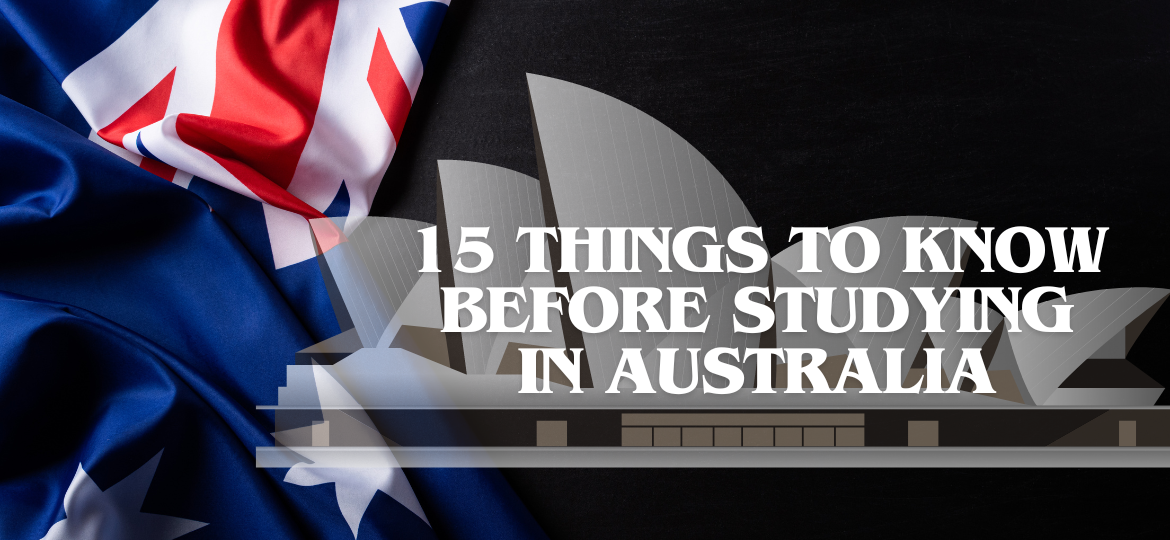
Overview of Studying in Australia
Studying abroad can be an exciting and life-changing experience, and Australia is a popular destination for international students. With its world-class universities, diverse culture, and stunning landscapes, Australia offers a unique opportunity for students to broaden their horizons and gain valuable skills and knowledge. However, before making the leap to study in Australia, there are several important things to consider.
In this article, we’ll explore 15 Things to Know Before Studying in Australia that every prospective international student should know before embarking on their educational journey Down Under.
Read More: Want To Study In Australia: Follow These Simple Steps
Germany vs Australia: Which is Better for Indian Students?
1. Visa Requirements
Before packing your bags for Australia, it’s essential to familiarize yourself with the visa requirements for international students. Depending on the duration and nature of your study program, you may need to apply for a student visa, which typically requires proof of enrollment in a recognized educational institution, sufficient funds to support yourself during your stay, and health insurance coverage.
2. Academic Excellence
Australia is home to some of the world’s top-ranked universities, renowned for their academic excellence and cutting-edge research programs. From engineering and medicine to arts and humanities, there are a wide variety of disciplines and study options available to international students. Whether you’re pursuing an undergraduate degree, a postgraduate qualification, or a research opportunity, you’ll have access to world-class education and expert faculty members.
3. Cultural Diversity
One of the most enriching aspects of studying in Australia is its cultural diversity. With a melting pot of cultures, languages, and traditions, Australia offers a welcoming and inclusive environment for students from all over the world. Whether you’re attending lectures, joining student clubs, or exploring the local community, you’ll have the opportunity to learn from people with diverse backgrounds and perspectives.
Read More: Top 5 Courses to Study in the Australia
UK vs Australia: Top Universities, Popular Courses, Eligibility Criteria
4. Cost of Living
While Australia offers a high standard of living and quality education, it’s essential to budget carefully for the cost of living expenses. From accommodation and groceries to transportation and leisure activities, living expenses can vary depending on the city and lifestyle you choose. Be sure to research the cost of living in your preferred study destination and factor in expenses such as rent, utilities, and food when planning your budget.
5. Employment Opportunities
Many international students choose to work part-time while studying in Australia to gain valuable work experience and supplement their income. Australia offers a range of employment opportunities for students, from retail and hospitality to internships and research assistantships. However, it’s essential to familiarize yourself with the visa regulations governing work rights for international students and ensure that any employment is compliant with your visa conditions.
6. Health and Wellbeing
Australia is known for its high-quality healthcare system and emphasis on health and wellbeing. As an international student, you’ll have access to affordable medical services and support through the Overseas Student Health Cover (OSHC) scheme. Be sure to familiarize yourself with the healthcare services available in your study destination and maintain a healthy lifestyle during your time in Australia.
7. Climate and Environment
From the tropical rainforests of Queensland to the rugged outback of the Northern Territory, Australia boasts a diverse range of climates and environments. Before studying in Australia, it’s essential to research the weather patterns and environmental conditions in your chosen study destination. Whether you’re braving the heat of the Australian summer or bundling up for winter in the southern states, be prepared for the unique climate of the Land Down Under.
8. Academic Calendar
The academic calendar in Australia may differ from what you’re accustomed to in your home country, so it’s important to familiarize yourself with the key dates and deadlines for your study program. Most universities in Australia operate on a semester-based system, with two main intakes in February/March and July/August. Be sure to check the academic calendar for your institution and plan your studies accordingly.
9. Student Support Services
Adjusting to life in a new country can be challenging, but Australia offers a range of support services to help international students settle in and thrive. From orientation programs and academic advisors to counseling services and student associations, there are plenty of resources available to support your academic and personal success. Don’t hesitate to reach out for assistance if you need help navigating the challenges of studying abroad.
10. Safety and Security
Australia is known for its safe and welcoming environment, but it’s still important to take precautions to ensure your safety and security while studying abroad. Familiarize yourself with local laws and customs, stay vigilant in public places, and take advantage of safety resources offered by your university or college. By staying informed and aware of your surroundings, you can enjoy a worry-free experience in Australia.
11. Accommodation Options
When studying in Australia, you’ll have a variety of accommodation options to choose from, ranging from on-campus dormitories to off-campus apartments and homestays. Consider your budget, preferences, and lifestyle when selecting accommodation, and be sure to research the amenities and services available in each option. Whether you prefer the convenience of on-campus living or the independence of renting your own place, there’s an accommodation solution to suit every student.
12. Transportation Networks
Getting around Australia is relatively easy thanks to its well-developed transportation networks, including trains, buses, trams, and ferries. Depending on your study destination, you may also have access to bike-sharing programs, car rental services, and ride-hailing apps like Uber. Familiarize yourself with the local transportation options and plan your travel accordingly to explore the sights and attractions of Australia.
13. Student Visa Regulations
To studying in Australia as an international student, you’ll need to obtain a student visa from the Australian government. The type of visa you require will depend on the type and duration of your study abroad program, as well as your personal circumstances. Be sure to carefully read and understand the visa requirements and conditions, and seek assistance from your educational institution or a qualified migration agent if needed.
14. Academic Integrity
Maintaining academic integrity is essential when studying in Australia, as universities and colleges have strict policies against plagiarism and cheating. Familiarize yourself with the academic integrity guidelines of your institution, and ensure that all your work is original and properly cited. If you’re unsure about citation methods or academic conventions, don’t hesitate to seek guidance from your professors or academic advisors.
15. Networking Opportunities
Studying in Australia offers excellent networking opportunities for international students, allowing you to connect with peers, professors, and industry professionals from around the world. Whether you’re attending academic conferences, participating in internships, or joining student clubs and organizations, you’ll have the chance to build valuable connections that can help advance your career and academic goals.
Additional Topic: Finding Part-Time Employment
Balancing studies with part-time employment is a common practice among international students in Australia. While working can provide valuable experience and financial support, it’s essential to strike the right balance and prioritize academic commitments. Many universities offer resources and support for students seeking part-time employment, including job boards, career services, and networking events.
When searching for employment opportunities, consider your schedule, skills, and interests, and aim for positions that complement your academic goals. Remember to communicate with your employer about your availability and academic responsibilities, and be proactive in managing your time effectively. By finding the right balance between work and study, you can gain valuable experience, enhance your skills, and achieve academic success during your time in Australia.
Conclusion
Studying in Australia is an exciting and rewarding experience that offers countless opportunities for personal and academic growth. By familiarizing yourself with the key considerations outlined in this article, you can make the most of your time Down Under and enjoy a successful and fulfilling study abroad experience. From visa requirements and academic excellence to cultural diversity and networking opportunities, Australia has something to offer every international student seeking adventure and education in a vibrant and welcoming environment. So pack your bags, prepare for an unforgettable journey, and get ready to embark on the adventure of a lifetime in the Land Down Under!
Frequently Asked Questions (FAQs)
1. What are the visa requirements for studying in Australia?
A. International students typically need to apply for a student visa, which requires proof of enrollment in a recognized institution, sufficient funds, and health insurance coverage.
2. What are the employment opportunities for international students in Australia?
A. International students can work part-time while studying in Australia, with opportunities ranging from retail and hospitality to internships and research assistantships.
3. How do I find accommodation in Australia?
A. Accommodation options in Australia include on-campus dormitories, off-campus apartments, and homestays. Research your options and consider factors such as budget and lifestyle preferences.
4. What support services are available for international students in Australia?
A. Australian universities offer a range of support services, including orientation programs, academic advisors, counseling services, and student associations, to help international students adjust to life in a new country.
5. How do I maintain academic integrity while studying in Australia?
A. It’s essential to familiarize yourself with your institution’s academic integrity guidelines and ensure that all your work is original and properly cited. Seek guidance from professors or academic advisors if needed.




